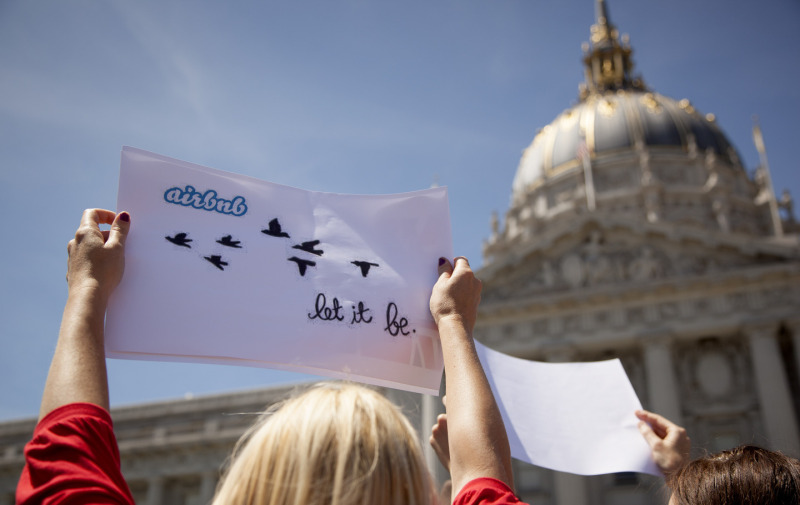The legislation that Mayor Ed Lee signed in October establishes a process for residents to become legal hosts. They must apply every two years through the city's Planning Department, the agency now charged with implementing and enforcing the new law. The application includes proof of residency, liability insurance and a $50 fee.
That biennial fee could be going up in the future because there are already concerns that the Planning Department won't have enough resources to be the city's Airbnb detective force, investigating complaints against hosts and cracking down on those who break the law.
"I think we’ve always known that the $50 fee would not cover all of the costs," says Scott Sanchez, who is overseeing enforcement for the department. "The idea was to have a fee that would be low to encourage people to come in and then register. "
In six months, if the Planning Department finds that the cost of the program requires more funding, the city controller can raise the application fee without further debate at the Board of Supervisors.
In the meantime, Sanchez says the department will also rely on other sources of funding, including the thousands of dollars in penalties that hosts could face for breaking the law, by either not registering or turning a full unit into a permanent rental.
Enforcement Help on the Way?
The Planning Department could soon have assistance in bringing penalties against law-breaking hosts.
District Six Supervisor Jane Kim, who voted for the ordinance, is sponsoring an amendment that would allow affordable housing nonprofits to directly sue hosts who break the law. That measure could get a final vote at the Board of Supervisors in March. She says her concern is that the ordinance lacks "enough teeth" to ensure effective enforcement.
"The city has too many cases, and nonprofits have been really helpful in helping us to assist and making sure laws are being followed," Kim says.
Fight at the Ballot Box Looming
Efforts to amend the ordinance could be upended by a measure that could make its way onto the November ballot. The initiative, from the group Share Better San Francisco, is expected to be completed in March and circulated for signature-gathering in April and May.
Share Better SF co-founder Dale Carlson says the existing legislation still leaves too much of the city's scarce housing stock at risk of permanently being pulled off the rental market.
"If they want to [rent out a room] for 90 days, 180 days, then you’re talking about somebody who really needs to be in the business of running a bed and breakfast," Carlson says, "And they should have a permit for that."
The measure would include many proposals that failed to gain passage at the Board of Supervisors during the debate over the bill last fall.
One would require hosting platforms to pay back taxes before any of the short-term rentals are legalized. Estimates for Airbnb's back taxes run as high as $25 million, but the company says it's already working with the city treasurer's office to resolve the matter.
Another piece would cap all rentals at 90 days a year, regardless of whether the host remains in the home during the guest's stay.
Of course, enforcement is also on the mind of Carlson and the measure's proponents.
The nonprofit "private right-of-action" provision would be included in the ballot item, and the city attorney will be given the power to go after hosts who violate the ordinance.
Despite her shared concerns over enforcement, Kim hopes a ballot battle can be avoided.
"While the legislation probably went 60 to 70 percent of the way to ensure [enforcement] is going to happen," she says, "it's not going to be able to enforce against all of the bad behavior that’s being spurred by this lucrative market. I’m looking forward to seeing if there are legislative opportunities that we can put in place."

